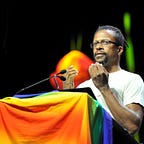‘Round Midnight
And so it begins…
The public and judicial enshrinement of the idea that “sincerely held belief” and “religious liberty” supersede public good, health and general wellbeing started last night when the Supreme Court, shortly before midnight, issued their opinion in Roman Catholic Diocese of Brooklyn, New York v. Andrew M. Cuomo, Governor of New York.[1] From Amy Howe at Scotusblog.com, “The Supreme Court late Wednesday night granted requests from the Roman Catholic Diocese of Brooklyn and two Orthodox Jewish synagogues to block enforcement of a New York executive order restricting attendance at houses of worship.[2] “
As I look at the case as it was presented to the Supreme Court, I can see the writing on the wall for LGBTQ rights…this new conservative court is going to support exemptions in favor of religious institutions without regard for the broader harm that those religious institutions may cause. Their majority opinion can only be seen as a tip of the hat to conservative religious communities that see themselves as somehow being victims under attack. Never mind the nationwide assault these conservative organizations have waged on general LGBTQ rights, women’s autonomy, Transgender health and public accommodation and even survivors of sexual assault. Associate Justice Gorsuch’s concurring wink and nod opinion hints at this when he states:
Government is not free to disregard the First Amendment in times of crisis. At a minimum, that Amendment prohibits government officials from treating religious exercises worse than comparable secular activities, unless they are pursuing a compelling interest and using the least restrictive means available. See Church of Lukumi Babalu Aye, Inc. v. Hialeah, 508 U. S. 520, 546 (1993). Yet recently,during the COVID pandemic, certain States seem to have ignored these long-settled principles.[3]
To be clear here, the Lukumi case that Justice Gorsuch references is one of the most quoted in cases seeking religious exemption to LGBTQ inclusion.
As a minister who currently wrestles every day with what it means to create, support, generate, fashion and design spiritual community without the benefit of physical presence, I understand the challenges faced by faith leaders. I grew up in traditions that were based on holy communion, I have a deep theological understanding of the sacraments in the Christian tradition and I have studied Jewish practices for the last decade as part of my education as a minister. But the argument as presented seems to be making the point that Governor Cuomo is somehow “anti-religion” in his position and favoring commercial business over spiritual wellbeing. Yet, they don’t mention the essential difference between how people gather to worship and how they gather in a restaurant.
Without getting into a lengthy analysis, the basic difference between the two is the way in which dining and worship manifest as intimate experiences. Communal worship is designed around the premise of bringing together people who aren’t normally in close proximity by creating a forced intimacy; by its very definition, communal worship is a super spreader event, meant to spread faith and shared experience. Sadly however, it is also a super spreader for Covid-19, the flu and any airborne illness. Dining on the other hand allows people to bring their isolated intimacies into the public setting and therefore can be managed in terms of maintaining isolations while providing unique intimacies. Diners are not sharing the same plate and glass.
But this is not the main problem with this decision. The Arch Diocese case is wrestling with the question of whether or not a government entity has any right at all to limit how and when people worship. The conservative court has ruled here that government cannot intervene in religious practice in any way under any circumstances even in a global pandemic. This is an incredibly dangerous premise because how then does one intervene when church organizations claim that conversion therapy is part of their religious practice? Or worse female genital mutilation and racial segregation?
Freedom of religion is important to maintain our Constitutional standards, but freedom from religion is equally important. What needs to happen here is that not only does church and state need to remain separate, but the question of religious belief as a personal framework needs to be separate from religious practice as a public facing act as well. If the method in which a religious practice is being carried out creates a public health threat for those who do not practice that religion, reason says that there must be limitations and considerations as to how it is exercised.
Moving into the next era of Supreme Court decisions will require all of us who are progressive faith leaders to remain vigilant and informed. This ruling was handed down around midnight before a national holiday. It literally snuck in. What is more, law is based largely on precedent. The precedent set by this decision is chilling. It is an onramp to solidifying the foundation for religious exemption to be the broad law of the land giving a pass to violent discrimination and bigotry. The conservative justices are poised to lead the way marching civil rights in the United States all the way back to 1789 one midnight decision at a time.
[1] Amy Howe, Justices lift New York’s COVID-related attendance limits on worship services, SCOTUSblog (Nov. 26, 2020, 2:18 AM), https://www.scotusblog.com/2020/11/justices-lift-new-yorks-covid-related-attendance-limits-on-worship-services/
[2] Ibid.
[3] Per Curiam, “2 ROMAN CATHOLIC DIOCESE OF BROOKLYN v. CUOMO,” 2020, 33.
Originally published at https://spirituwellness.com on November 26, 2020.
